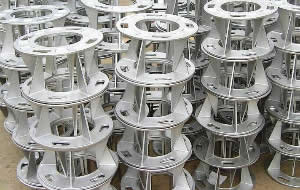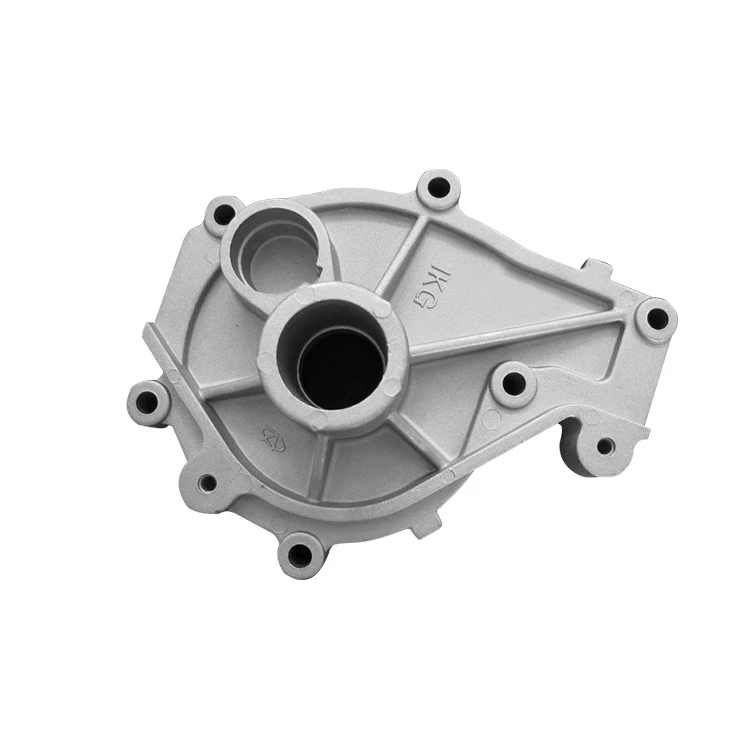How Shop Provider Enhance Manufacturing Performance and High Quality in Industrial Applications
Foundry services play an important role in boosting production performance and high quality throughout different commercial applications. By implementing innovative metal casting strategies, these solutions assure elements are produced with precision and uniformity. This not just lowers lead times but likewise lessens waste, cultivating far better collaboration between shops and manufacturers. The impact of high-grade components on operational efficiency raises important questions about the future of industrial manufacturing. What developments exist in advance in this advancing landscape?
The Function of Factory Providers in Streamlining Production Processes

Furthermore, factories commonly give competence in alloy growth, allowing makers to make use of innovative materials that enhance item performance. The collaboration between shops and suppliers cultivates a better understanding of production needs, bring about maximized processes and enhanced product styles. By leveraging foundry solutions, makers can accomplish higher adaptability, adapt to changing market needs, and keep competitiveness in the industry. In general, the function of shop solutions is necessary in assisting in an extra affordable and effective manufacturing landscape.
Advanced Technologies in Factory Operations
Innovative technologies are changing factory procedures, considerably enhancing performance and precision. Automation plays a vital function, with robotic systems enhancing repetitive tasks such as molding and product handling. Additionally, innovations in computer-aided design (CAD) and computer-aided manufacturing (CAMERA) systems enable foundries to develop complex geometries with better accuracy and reduced material waste.
The integration of fabricated knowledge (AI) and machine knowing improves high quality control by keeping an eye on processes in real-time and anticipating prospective defects prior to they occur. Making use of sophisticated products, such as lightweight alloys and composites, additionally enhances the performance characteristics of cast items.
Additionally, 3D printing technology is reinventing prototyping and tooling, enabling rapid customization and minimized preparations. Jointly, these advanced technologies not only boost production performance yet likewise guarantee that the end products satisfy strict quality criteria, positioning foundries at the leading edge of modern industrial applications.
Minimizing Lead Times With Effective Foundry Practices
Efficient factory techniques play an important function in reducing preparations within manufacturing settings. By carrying out streamlined production procedures and progressed organizing techniques, suppliers can enhance operations and maximize source allocation. These improvements not just increase outcome however also contribute to overall functional performance.
Streamlined Production Procedures
Improving manufacturing procedures is crucial for minimizing preparations in the production sector. Effective factory methods, consisting of maximized workflows and resource administration, play an essential function in attaining this objective. By decreasing waste and improving communication among groups, factories can greatly boost their functional efficiency. The implementation of standardized procedures additionally adds to regular top quality and faster turnaround times, allowing suppliers to react even more swiftly to market demands. Additionally, the combination of innovative technologies, such as automation and real-time monitoring systems, helps in identifying traffic jams and helping with timely interventions. Overall, an emphasis on structured production procedures not only accelerates preparations but also improves the general competitiveness of commercial applications, guaranteeing that products meet client assumptions effectively.
Advanced Organizing Techniques
Reliable production procedures normally lead manufacturers to check out advanced organizing strategies as a means to even more minimize preparations. By employing advanced algorithms and software application, foundries can enhance process, aligning production routines with demand projections and resource schedule. Techniques such as Just-In-Time (JIT) organizing lessen inventory prices while ensuring prompt material delivery, therefore improving functional effectiveness. Furthermore, incorporating real-time data analytics allows foundries to expect possible hold-ups and adjust timetables proactively. This flexibility not only streamlines operations however also enhances overall performance. Moreover, collective preparation with distributors and clients can promote a more integrated supply chain, further lowering preparations. Eventually, these advanced organizing methods equip factories to attain higher efficiency and superior top quality in their manufacturing processes.
Making Sure Accuracy and Quality in Steel Spreading
Ensuring accuracy and quality in steel casting needs a meticulous technique that includes every phase of the manufacturing process. This process starts with careful style and site link design of the great post to read mold and mildews, guaranteeing they can endure the molten metal's temperature level and pressure. The option of premium raw products is vital, as contaminations can jeopardize the end product.
When the materials are prepared, accurate temperature level control throughout melting and putting is basic to achieve the wanted residential properties in the actors metal. Keeping an eye on solidification and air conditioning rates more assurances dimensional precision and surface coating.
Quality control techniques, such as non-destructive screening and assessment, are vital to recognizing problems early while doing so. Precision aluminum casting. In addition, using skilled workers that understand the subtleties of steel casting adds significantly to maintaining high criteria. On the whole, these methods collectively improve the integrity and performance of cast elements in various industrial applications
Lessening Waste and Maximizing Source Usage

Additionally, reusing scrap metal within the factory itself can substantially reduce waste, changing byproducts right into functional sources. Lean producing principles likewise add to lose decrease by enhancing procedures and removing unneeded steps, resulting in a lot more efficient procedures.
Moreover, routine maintenance of tools warranties peak efficiency, protecting against break downs that can cause thrown away materials. By concentrating on these strategies, foundries not just minimize costs yet also add to lasting methods, straightening with the expanding need for environmentally responsible manufacturing approaches in commercial applications.
The Affordable Benefit of High-Quality Elements on the market
Top notch components give a significant affordable benefit in the foundry market, where precision and sturdiness are extremely important. Suppliers that focus on superior products and craftsmanship can improve product performance and integrity, leading to raised customer satisfaction. This benefit is specifically obvious in industries such as automotive and aerospace, where part failing can have tragic repercussions.
High-quality components often result in reduced upkeep prices and expanded item lifespans, which can be enticing marketing points for prospective clients. As market needs grow for reliable and sustainable modern technologies, the focus on quality comes to be much more vital. Business that purchase top notch shop services not just boost their manufacturing processes but likewise separate themselves from competitors that might give up top quality for expense financial savings. The commitment to premium parts ultimately translates right into a more powerful market setting and long-term organization success.
Regularly Asked Questions
What Sorts of Products Do Shop Provider Commonly Collaborate With?
Shop services normally deal with metals such as light weight aluminum, iron, steel, and brass, along with different alloys. They additionally deal with products like compounds and ceramics, satisfying diverse commercial demands and specifications in making processes.
How Do Foundry Provider Effect Overall Supply Chain Monitoring?
Foundry solutions considerably improve supply chain administration by improving product sourcing, reducing preparations, and ensuring constant quality. Their ability to supply tailored services cultivates cooperation among stakeholders, ultimately improving overall operational performance and responsiveness in manufacturing.
What Industries Advantage A Lot Of From Shop Services?
Industries such as automotive, aerospace, consumer, and building goods substantially benefit from foundry services. These industries depend on accuracy castings to satisfy stringent quality requirements and enhance their overall manufacturing procedures and product performance.
Are Foundry Providers Sustainable and Eco-friendly?
Factory solutions can be ecologically friendly and lasting, specifically when using innovative technologies and procedures - Aluminum Foundry. Innovations such as recycling materials, lowering exhausts, and maximizing energy usage add to minimizing their environmental effect in industrial applications

Exactly How Can Companies Pick the Right Foundry Solution copyright?
Companies can pick the ideal shop provider by assessing proficiency, manufacturing capacities, quality accreditations, modern technology check it out utilized, consumer reviews, and sustainability techniques while making certain placement with their details job requirements and lasting business goals.
Shop services play a vital function in boosting production effectiveness and quality across different commercial applications. The partnership between manufacturers and shops cultivates a far better understanding of production demands, leading to optimized processes and enhanced item styles. Efficient shop techniques play a crucial role in decreasing lead times within production settings. By utilizing innovative formulas and software program, shops can maximize process, lining up manufacturing schedules with need forecasts and source schedule. Firms that invest in high-quality shop solutions not just enhance their production processes yet additionally separate themselves from competitors that may sacrifice quality for expense savings.